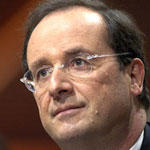What will the French elections mean for renewables?
Socialist candidate François Hollande may have won the first round of the French elections, but what are his plans for wind energy if he manages to pip Nicholas Sarkozy to head the country in the second round next month. And, if Mr Sarkozy manages to turn the situation around and retain his title, is he likely to support renewables during a second term as the president of France?
Unsurprisingly, renewable energy was not the main consideration of the majority of the French voters on Sunday. Indeed, despite the clear need to reduce greenhouse gas emissions and Europe’s commitment to be leader in the fight against climate change, Green candidate Eva Joly received only 2% of the French votes. However, after the initial result was announced, Joly immediately called for her supporters to vote for Hollande in the second round.
While the main thrust of Hollande’s campaign was focused, like that of all the candidates, on the need to help France escape the clutches of the global economic crisis and confront the challenges of globalisation, energy was nonetheless a key tenet of his programme. He promised that, if elected, he would “preserve the independence of France by diversifying our sources of energy”. This would include “a reduction in the share of nuclear in the production of electricity from 75% to 50% by 2025” and an “increase in the power of renewable energies”. He said that France would likewise “respect its international engagements to reduce greenhouse gas emissions”.
On the other hand, Nicholas Sarkozy confirmed simply that he would support “the choice of nuclear power, energy that emits the least greenhouse gas emissions, in order not to increase the price of electricity bills, while continuing the development of renewable energies”.
In an article published in the French daily Le Monde in October last year, a group of MPs from the “ecological” wing of the Socialist party vaunted the “social-ecology” of François Hollande over the “environmental passivity of the right”. They claimed that after 10 years of centre-right leadership, “France invests nine times less than Germany and five times less than China in clean energy” and highlighted that ”no French business figures among the top 10 producers worldwide of wind turbines or photovoltaic panels”. The politicians rued that in terms of wind production per inhabitant, France lagged in thirteenth place in Europe and highlighted that there was still no offshore production in France – though since then Sarkozy has awarded tenders to build offshore wind farms to produce 2GW of energy.
The politicians concluded that only François Hollande could reverse France’s fortunes in the area of renewable energy, and green lobby groups certainly seem to back this thinking. For example, Greenpeace France notes that the Socialist candidate has called for the EU to increase its greenhouse gas emissions target to 30% by 2020, something Sarkozy has refused to support, and rates Hollande as “engaged” in terms of developing alternatives to fossil fuels, while it believes Sarkozy is stuck in the past on this issue.
It now remains to be seen whether Hollande can keep this momentum on 6 May when the final runoff vote will be held and whether, if elected, he keeps his pledges to boost renewable energy in France.







